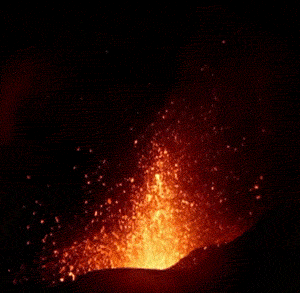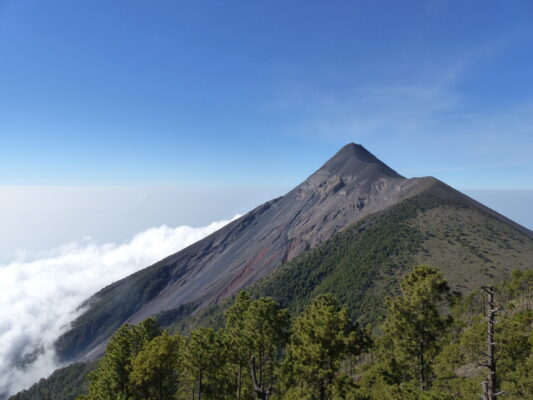
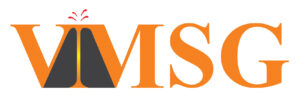
Dear everybody, welcome to the final VMSG newsletter of 2023! There’s a lot in store for you, including details of our next annual meeting, VMSG2024. Hosted by the University of Bristol and celebrating 60 years of our community, it promises to be a very special gathering. Here you can find the final scientific programme and information on the film outreach event at the Watershed. Moving onwards, we hear from our student cohort: welcoming our new VMSG Student Rep, Rahul Subbaraman, and feature Nemi Walding’s VMSG Student Bursary report on her work in the enchanted Aeolian archipelago. Immediately after VMSG2024, another volcanology community gathers: the New GW4+ Volcanic Plumes Community will meet in Bristol on Monday 8 January and encourage you to get involved. Submissions are invited to two EGU2024 sessions, and readers may be interested in a new “Ashvances” seminar series from the IAVCEI Commission on Tephra Hazard Modelling. The newsletter closes with a regular round-up including jobs and other opportunities – and that’s a wrap!
This is my final issue as VMSG Newsletter Editor. It has been such a pleasure to share and enjoy your news since I began in January 2021; I’ve loved working with our community in this role. Thank you for your submissions, for your correspondence, and for reading. I can’t wait for future issues. Wishing you a happy and peaceful end of 2023! – Ailsa Naismith
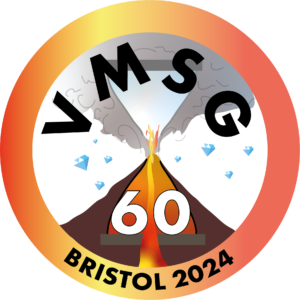 We are on the threshold of our next annual meeting, held at the University of Bristol on Wednesday 3 – Saturday 6 January 2024. We’re so excited to welcome you to Bristol, particularly because in 2024 we will be celebrating the VMSG’s 60th anniversary. This annual meeting will celebrate the VMSG’s illustrious history, including a keynote speech by Prof Sir Steve Sparks on Thursday 4 January before the conference dinner. Besides the jam-packed scientific programme (see below!), we have pre-conference workshops on Wednesday 3 January, an outreach event at the Watershed cinema and café-bar in central Bristol on the evening of Friday 5 January, and for a lucky few, a post-conference field trip on Saturday 6 January to a local volcanic outcrop.The final scientific programme for the meeting is available here: https://vmsg.org.uk/wp-content/uploads/2023/12/Draft-Scientific-Programme.pdf .
We are on the threshold of our next annual meeting, held at the University of Bristol on Wednesday 3 – Saturday 6 January 2024. We’re so excited to welcome you to Bristol, particularly because in 2024 we will be celebrating the VMSG’s 60th anniversary. This annual meeting will celebrate the VMSG’s illustrious history, including a keynote speech by Prof Sir Steve Sparks on Thursday 4 January before the conference dinner. Besides the jam-packed scientific programme (see below!), we have pre-conference workshops on Wednesday 3 January, an outreach event at the Watershed cinema and café-bar in central Bristol on the evening of Friday 5 January, and for a lucky few, a post-conference field trip on Saturday 6 January to a local volcanic outcrop.The final scientific programme for the meeting is available here: https://vmsg.org.uk/wp-content/uploads/2023/12/Draft-Scientific-Programme.pdf .
After the VMSG AGM, we warmly invite you to join our outreach event at the Watershed. The event will include two films: Into The Inferno (2016) (screened at 18:00 in Cinema 1) and Lava Bombs (2021) (screened at 21:00 in Waterside 3). Into The Inferno will be preceded by an introduction with Professor Clive Oppenheimer. Between the two films (20:00 – 21:00), we’ll be in the Watershed’s events room, Waterside 2, where a wealth of artists, scientists, engineers, and poets will be sharing their connections to the earth with volcanologists and the Bristol public alike! Entry to the Watershed, to the outreach hour in Waterside 2, and to see Lava Bombs is free, but screening of Into The Inferno is ticketed. Tickets are available here: https://www.watershed.co.uk/whatson/12384/into-the-inferno – please note that discounted tickets are available to under-25s! Watershed is also offering a 10% discount on all food and drink bought in the Watershed Café Bar to those who show a VMSG2024 pin & badge. For those who are travelling from further afield, Watershed has partnered with two nearby hotels that offer a 10% discount on accommodation for event attendees: the Clayton Hotel and the Bristol Hotel. To accesss the discount for The Bristol Hotel, you only need to say that you have a conference at the Watershed. The Clayton Hotel discount can be accessed by following the instructions here.
We are so looking forward to welcoming you to colourful Bristol in January! – University of Bristol LOC
Welcome to the new student rep, Rahul Subbaraman! Rahul is a 2nd year PhD student at the University of Manchester. Rahul will be joining Kerys Meredew from 2024 as an advocate for student voice in the committee, replacing Eilish Brennan. Thanks Eilish for your excellent contributions to the committee!
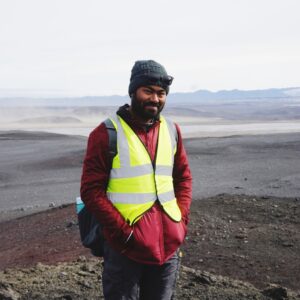 Rahul says: I am currently in my second year of PhD in Earth Sciences at the University of Manchester. My project, titled “Mapping the Magma-Mush Interface”, involves investigating the textures and chemistry of well-preserved crystalline nodules from Gı́göldur in Iceland’s Northern Volcanic Zone. The primary goal is to gain a comprehensive understanding of how the physicochemical properties of crystal mushes evolve over time and how melt- and crystal-rich environments influence the behaviour and evolution of deep magma plumbing systems. Excitingly, I have recently become a member of the VMSG Committee as a student representative. I am eager to seize this incredible opportunity to expand my professional network, establish meaningful connections, and further my passion for scientific communication and outreach within the fields of petrology, geochemistry, and volcanology. I am enthusiastic about developing a mentorship program to support students and early career researchers in their academic journeys.
Rahul says: I am currently in my second year of PhD in Earth Sciences at the University of Manchester. My project, titled “Mapping the Magma-Mush Interface”, involves investigating the textures and chemistry of well-preserved crystalline nodules from Gı́göldur in Iceland’s Northern Volcanic Zone. The primary goal is to gain a comprehensive understanding of how the physicochemical properties of crystal mushes evolve over time and how melt- and crystal-rich environments influence the behaviour and evolution of deep magma plumbing systems. Excitingly, I have recently become a member of the VMSG Committee as a student representative. I am eager to seize this incredible opportunity to expand my professional network, establish meaningful connections, and further my passion for scientific communication and outreach within the fields of petrology, geochemistry, and volcanology. I am enthusiastic about developing a mentorship program to support students and early career researchers in their academic journeys.
It was excellent to see so much enthusiasm for joining the committee. Thank you to the other candidates who put themselves forwards for this position!
Through this grant’s support, I successfully undertook a field expedition to Lipari, Italy, in collaboration with Dr. Lucchi and esteemed colleagues.
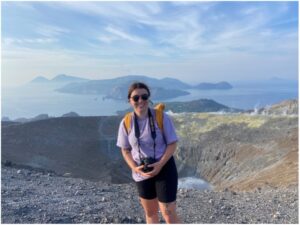
Nemi above Vulcano’s La Fossa crater
The initial inspiration for this fieldwork stemmed from the work of Lucchi et al. (2022) on the Brown Tuffs of Lipari. Their research inspired me to pursue the Utrecht Grant Scheme, a mobility grant tailored for postgraduate students seeking to engage in overseas studies. I intended to collaborate with Dr. Lucchi at the University of Bologna. Thanks to the generous support of the VMSG bursary, I was able to conduct extensive fieldwork on the island, engage in insightful discussions, and meticulously gather data for subsequent analysis at the University of Bologna.
In the context of my ongoing PhD research, my focus centers on the intricate interaction between substrate and pyroclastic density currents, specifically examining how substrate moisture influences erodibility and flow dynamics through the utilization of experimental flume modelling. My colleagues and I have devised a technique for setting experimental deposits within gelatine, facilitating the excavation and sectioning of these deposits for analysis. The outcomes of these experimental currents unveiled compelling evidence of substrate erosion and remobilization, mirroring the observations made by Lucchi et al. (2022) within the Brown Tuff deposits. The research of these deposits has not only contributed to the validation of my experimental findings but has also enriched other areas of my thesis. Additionally, the collection of Brown Tuff samples during this fieldwork will strengthen my ongoing research.
Furthermore, I joined the prestigious AIV Volcanology School 2023 on a geological tour of Vulcano and Stromboli. This opportunity greatly expanded my knowledge and allowed me to experience incredible physical volcanology under the guidance of experts in these localities.
I am beyond grateful to the VMSG committee for their support and financial assistance, which made these experiences possible. Grazie! – Nemi Walding
Take a peek at Nemi’s research profile here.
Dear colleagues,
 We are delighted to announce that a new GW4 research community focused on our favorite topic: volcanoes! This will be mostly of interest to colleagues from the universities of Bath, Bristol, Cardiff and Exeter, but we hope that this will create further opportunities to work with the whole UK and international volcanology family. Our community is entitled “Volcanic Plumes from the Seafloor to the Edge of Space”. We are very excited for our upcoming kick-off workshop on Monday, 8 January 2024 in Bristol, right after your favorite meeting of the year (obviously the VMSG annual meeting)! We look forward to supporting our early career research community through funding for VMSG meetings attendance and small GW4 research projects, with priority given to researchers from backgrounds under-represented in volcanology. Stay tuned for our next project funding call in January 2024. You can subscribe to our mailing list here and contact Thomas with any questions (t.aubry@exeter.ac.uk). We look forward to seeing you in Bristol! – Thomas Aubry, Neil Hindley, Ricardo Ramalho and Mark Woodhouse
We are delighted to announce that a new GW4 research community focused on our favorite topic: volcanoes! This will be mostly of interest to colleagues from the universities of Bath, Bristol, Cardiff and Exeter, but we hope that this will create further opportunities to work with the whole UK and international volcanology family. Our community is entitled “Volcanic Plumes from the Seafloor to the Edge of Space”. We are very excited for our upcoming kick-off workshop on Monday, 8 January 2024 in Bristol, right after your favorite meeting of the year (obviously the VMSG annual meeting)! We look forward to supporting our early career research community through funding for VMSG meetings attendance and small GW4 research projects, with priority given to researchers from backgrounds under-represented in volcanology. Stay tuned for our next project funding call in January 2024. You can subscribe to our mailing list here and contact Thomas with any questions (t.aubry@exeter.ac.uk). We look forward to seeing you in Bristol! – Thomas Aubry, Neil Hindley, Ricardo Ramalho and Mark Woodhouse
Dear colleagues,
We invite submissions to our session at EGU 2024, “Advances in experimental volcanology: closing the gap between simulations and the reality of sub-aerial volcanic hazards”. You can find more information on our session and instructions to submit abstracts at the following link: Session NH2.4 (copernicus.org). Please note the abstract submission deadline is Wednesday, 10 January 2024. – Fabio Dioguardi, Sylvain Charbonnier, Morgan Hetherington, Audrey Michaud-Dubuy, Ilaria Rucco
Dear colleagues,
In view of the next EGU in Vienna on 14 – 19 April 2024, we would like to draw your attention to our multidisciplinary session, “Volcanic plumes: insights into volcanic emissions and their impacts on the environment, atmosphere and climate”. The full details of the session theme and instructions to submit abstracts are available at the following link: Session GMPV8.8 (copernicus.org). Abstract submission is open and will remain open until Wednesday, 10 January 2024.
Best regards and see you in Vienna. – Giuseppe G. Salerno, Pasquale Sellitto, Corinna KlossECS, Tamsin Mather, Stefano Corradini
Dear colleagues,
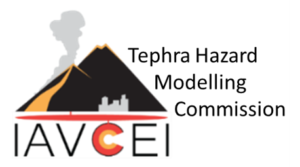 The Commission for Tephra Hazard Modelling of the International Association of Volcanology and Chemistry of the Earth’s Interior (IAVCEI) is delighted to announce a new quarterly online seminar serie, “Ashvances in Tephra Hazard Modelling”. Each seminar will consist of two 15-20-minute talks with 5-10 minutes for questions. The last 10 minutes will be kept for general discussions, e.g., how our commission can serve you better, and socializing/networking. At least one of the talks will be by an early-career researcher, and we will use this seminar series to showcase the work of researchers with backgrounds underrepresented in volcanology. Time zones will be selected based on the location(s) of speakers and we will aim to rotate these as much as possible to reach audience members from across the globe and give everyone an equal and fair chance to participate in the seminars. We aim that by having two talks per seminar, each session will cover multiple topics, including but not limited to numerical modelling, field studies, laboratory experiments and risk communication/management.
The Commission for Tephra Hazard Modelling of the International Association of Volcanology and Chemistry of the Earth’s Interior (IAVCEI) is delighted to announce a new quarterly online seminar serie, “Ashvances in Tephra Hazard Modelling”. Each seminar will consist of two 15-20-minute talks with 5-10 minutes for questions. The last 10 minutes will be kept for general discussions, e.g., how our commission can serve you better, and socializing/networking. At least one of the talks will be by an early-career researcher, and we will use this seminar series to showcase the work of researchers with backgrounds underrepresented in volcanology. Time zones will be selected based on the location(s) of speakers and we will aim to rotate these as much as possible to reach audience members from across the globe and give everyone an equal and fair chance to participate in the seminars. We aim that by having two talks per seminar, each session will cover multiple topics, including but not limited to numerical modelling, field studies, laboratory experiments and risk communication/management.
We were delighted to host Liam Kelly (Vanderbilt University) and Costanza Bonadonna (University of Geneva) for our kick-off seminar in September, and we enjoyed hearing from Hannah Moore (University of Tasmania) and Fukashi Maeno (University of Tokyo) at our last seminar on Wednesday 29 November 2023. Register for our next seminar [here]! All seminar recording will soon be available on our website (thm.iavceivolcano.org). We are always looking out for new speakers in future seminars. Please use this form to register your interest in being a speaker or suggest a student/colleague*. We particularly encourage (self-) nomination of diverse and early career scientists.
We look forward to seeing you at our next seminar! – Thomas Aubry, Alastair Hodgetts and Paul Jarvis
ROTTnROCK is a newly funded European Research Council Synergy grant, led by Thomas Walter (GFZ Potsdam, Germany), Valentin Troll (Uppsala University, Sweden), Michael Heap (Strasbourg University, France), and Claire Harnett (University College Dublin, Ireland). The ROTTnROCK project was awarded 9,989,653 Euros for six years to study the role of hydrothermal alteration on volcano morphology, instability, and unpredictable volcanic hazards. The project will start in earnest next year, when we will be advertising 16 PhD and postdoc positions! At GFZ (main supervisor Thomas Walter; twalter@gfz-potsdam.de), there will be 3 PhD studentships and 1 post-doc. At Uppsala (main supervisor Valentin Troll; Valentin.Troll@geo.uu.se), there will be 2 PhD studentships and 2 postdocs. At Strasbourg (main supervisor Michael Heap; heap@unistra.fr), there will be 3 postdocs. And at Dublin (main supervisor Claire Harnett; claire.harnett@ucd.ie), there will be 3 PhD studentships and 2 postdocs. So if you’re interested in getting involved, either directly as a PhD student or a postdoc, or alteratively as a collaborator, please get in touch – and watch this space! The adverts will be circulated widely, but you can keep up-to-date on the ROTTnROCK project by visiting our website (http://rottnrock.eu) or our socials (@ROTTnROCK on X and @rottnrock.bsky.social on Bluesky Social). – Mike Heap, Claire Harnett
The UWI Seismic Research Centre, located in Saint Augustine (Trinidad & Tobago), is seeking a research fellow to carry out seismic monitoring and analysis as part of a team that provides real-time earthquake and volcanic surveillance in the Eastern Caribbean. The successful candidate will play a lead role in the operations, maintenance and further development of seismological data acquisition, and oversee the operational and technical aspects of the seismological monitoring network.
The closing date for applications is Sunday 14 January 2024. Full details for the role can be found here. Applications received after the closing date will not be considered.
The University of Leicester seeks a project manager for a fixed-term contract (until 31/12/2024). The successful candidate will form part of an established team that acquires and analyses core petrophysical and downhole measurement data, and will be responsible for the financial, contractual, and administrative side of the International Ocean Discovery Program (IODP) team at Leicester. The ideal candidate would contribute to all IODP expedition activities of the group, including the operational planning of ocean research drilling and coring projects.
The closing date for applications is Tuesday 2 January 2024. Full details of the role can be found here. Informal enquiries are welcome and should be made to Tim van Peer at tevp1@leicester.ac.uk.
The University of Southampton’s School of Ocean and Earth Science (SOES) is seeking to appoint a Lecturer/Associate Professor in Applied Geology or Environmental Geoscience, with research interests in one or more of the following areas: volcanology; mineral resources with applications to the energy transition; environmental or hard-rock geochemistry; igneous petrology. The post-holder will be based at the National Oceanography Centre Southampton, within the University’s Faculty of Environmental and Life Sciences.
The deadline for applications is Monday 22 January 2024. Full details of the role are available here.
The University of Bristol’s School of Earth Sciences seeks to appoint a postdoctoral researcher for 2.5 years to work on geodetic inverse modelling as part of the ERC grant “Imaging Magmatic Systems”. The postdoc will develop new models to image strain within magmatic systems, and explore the links with crustal rheology and eruption forecasting. Applicants should have experience of geophysical modelling in the solid earth geosciences, and ideally have experience using geodetic data to study the earthquake cycle or volcanic deformation.
The closing date for applications is Wednesday 10 January 2024. Full details of the role are available here.
The British Geological Survey (BGS) seeks a geothermal scientist/science lead for the UK Geoenergy Observatory in Glasgow (UKGEO). The postholder join BGS to lead on geothermal science direction, scientific delivery, and utilisation of the UK Geoenergy Observatory in Glasgow. This senior role will deliver impacts towards decarbonisation of heat/cool/storage by advancing the evidence base and innovations in shallow geothermal from the unique subsurface observatory. The position is based at the BGS offices in Edinburgh (situated on the Heriot-Watt University campus), with regular travel to the UKGEOS Glasgow site and nationally.
The closing date for receipt of applications is Sunday 14 January 2024. Full details for the role are available here.
Do you have any job opportunities, PhD viva voce celebrations, or funding opportunities that you would like to advertise in this area? If so, please get in touch with the VMSG Committee to share your news in a future newsletter!
Don’t forget to keep in touch with us and other volcanologists around the world. There are several ways you can do this: through the VMSG PhD and ECR directory (here), the Arizona State University mailing list (here), and the VMSG mailing list (here).
